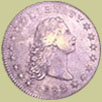 Honest
Money Honest
Money
What It Is and What It Isn't
Money Part III - Savings and
Credit
Douglas V. Gnazzo
March 31, 2006
Savings
With the continued growth of
commerce and the division of labor, the economy oscillates between
supply and demand, buyers and sellers, producers and consumers.
When through the course of
wise and prudent commerce, man produces more than he consumes,
an individual will begin to accumulate their excess production
- the fruits of their labors.
The same holds true for the
group, society, nation, and world. This is commonly called savings
or the accumulation of wealth.
A saver of money over time
knows the importance of the quality of his money versus the quantity
of it.
The prudent man saves his money
for the future, for his later years in life, when he will not
be able to work as hard to earn the money needed to pay for life's
necessities, when his income will be less.
In the later years of life,
man uses his saved money or accumulated wealth to turn back into
income, to obtain the necessities of life: food, clothing, shelter,
and healthcare.
The more the saver's money
has retained its quality or purchasing power, the wealthier,
and better off he will be. He will be able to procure by exchange
more of the things he needs to maintain his survival and standard
of living with.
This is why savings is so important.
This is why the quality of money is so important, although there
are other reasons as well. For now, these will suffice.
Honest Money retains
its purchasing power
And is the ultimate store of wealth.
Credit
Once society chooses a common
medium of exchange, commerce increases to the point that
people want to borrow or lend the common medium of exchange,
money, to further increase their ability to trade goods and expand
commerce.
The quality theory of money
emphasizes the functions of money as a standard of value through
time, and as a store of value over time.
A lender of money or credit
wants to be repaid with money that will be worth, as much in
the future as it was when he lent it in the present, which soon
becomes the past.
He wants the money
he is repaid with to retain its purchasing power.
If a lender of money does not
have faith that the money he lends will retain its value or purchasing
power in the future, he will charge extra to loan the money out,
to make up for the perceived or expected loss of future purchasing
power of the money.
He will have a greater interest
in being made whole, and will charge accordingly. The interest
rate cost of borrowing money increases to make up for the perceived
future risk of loss of purchasing power. Risk versus reward is
of the essence.
Time Preference
With the advent of credit,
man takes a leap into the future. What had originally begun as
direct exchange in the present now became indirect exchange,
not only in the present, but in the future as well. This involves
present goods and future goods.
Money involves time preference
- the present and the future, as man's life involves
the present and the continuance of the present into the future
as survival or living.
Indirect exchange
overcomes the coincidence of wants
in the present by invoking the concept of value in the
future.
Money is the standard of
value that according to the consensus of society is most
likely to continue to exchange in the future, at the present
ratio or value. In other words, money is a standard of value
through and over time.
The word credit comes from
the root credere, which means to believe in or to have
faith...
... Read the full
report on Doug's new website.
-Douglas V. Gnazzo
email: Douglas V, Gnazzo
website: HonestMoneyReport
Honest Money: What it
is and what it isn't
Part
I : Part II : Part
III : Part IV : Part
VI : Part V : Part
VII : Part
VIII
Douglas V.
Gnazzo
is CEO of New England Renovation LLC, a historical restoration contractor
that specializes in restoring older buildings that are vintage historic
landmarks. He writes for numerous websites and his work appears
both here and abroad. Just recently he was honored by being
chosen as a Foundation Scholar for the Foundation for
the Advancement of Monetary Education (FAME).
©2006 Douglas
V. Gnazzo. All Rights Reserved.
321gold Inc

|